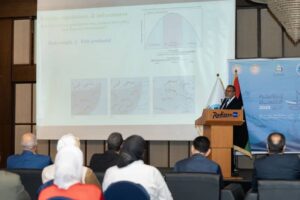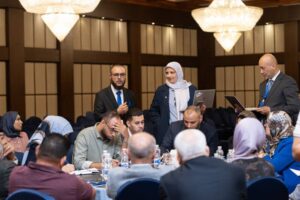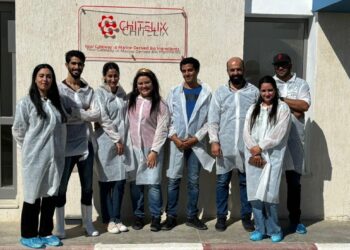Tripoli Explores the Future of the Blue Economy: Aquaculture at the Core of the Debate
The Radisson Blu Mahari Hotel hosted Libya’s National Workshop on the Blue Economy Strategy 2025, bringing together government representatives, members of the National Committee for the Blue Economy, the United Nations Development Programme (UNDP), and local and international organizations.
Over two days, participants worked toward shaping a national vision for how Libya can harness its Mediterranean resources to foster economic growth and social development. For coastal nations like Libya, the “blue economy” is no longer a distant concept—it has become a strategic priority, linking food security, sustainable development, and new opportunities for prosperity.

The Sea as a Development Opportunity
With one of the longest coastlines in the Mediterranean, Libya remains underutilized in terms of its economic potential. Reliance on traditional fishing and imports highlights the need to explore new sectors, including marine tourism, renewable energy, and aquaculture.
Dr. Masauda Abuarosha, National Coordinator for the Western Mediterranean Blue Economy Initiative, emphasized the transformative role of aquaculture:
“Aquaculture is not just about producing fish. It is a way to create jobs, diversify income, and reduce dependence on imports. With proper quality and cold-chain standards, Libya could even position itself as an exporter to Mediterranean markets.”
From Food Security to Export Potential
Aquaculture’s significance extends beyond bridging food supply gaps. According to Dr. Abuarosha, the sector can:
- Guarantee a stable supply of marine protein, reducing vulnerability to import fluctuations.
- Generate direct employment in farming and technical operations, and indirect jobs in processing, logistics, and distribution.
- Unlock export opportunities by meeting strict quality and safety standards.
- Create synergies with marine tourism, seaweed farming, and bioenergy initiatives.
Challenges on the Horizon
Despite its promise, Libya’s aquaculture sector faces serious challenges. Dr. Abuarosha cautioned:
“This cannot remain on paper. Financing, legislation, and infrastructure are the backbone of success, and they cannot be delayed.”
Key obstacles include:
- Limited financing and a lack of credit facilities for small and medium-sized farms.
- Gaps in regulatory frameworks and food safety standards.
- Weak infrastructure, particularly cold-chain capacity and export-ready ports.
- High dependency on imported feed and vaccines.
- Shortage of skilled professionals and applied research capacity.
- Community concerns about environmental impacts and competition with artisanal fisheries.

A Step-by-Step Roadmap
To move forward, Dr. Abuarosha proposed a phased strategy:
- Short term (0–12 months): Pilot projects, feasibility and environmental studies, training programs, and a simple licensing framework.
- Medium term (1–3 years): Scale up successful pilots, establish microcredit schemes, incubators, and logistics networks.
- Long term (3–5 years): Build export capacity, align with international standards, and integrate aquaculture fully into national blue economy planning.
Three Possible Scenarios
Dr. Abuarosha outlined three potential outcomes for Libya’s blue economy:
- Optimistic: Full implementation leads to medium-scale aquaculture projects, higher production, job creation, and exports.
- Moderate: Partial progress brings limited growth and capacity building, but export challenges persist.
- Negative: Failure to act leaves aquaculture stalled at the experimental stage, reinforcing reliance on imports.
Indicators of Progress
Key benchmarks to monitor include:
- Annual aquaculture production (tons/year).
- Number of licensed and operational farms.
- Direct and indirect jobs are created.
- Public and private investments secured.
- Export volumes and revenues generated.
Toward a Sustainable Blue Economy
The Tripoli workshop marks the beginning of a national dialogue on how the sea can drive Libya’s future development. Aquaculture could become a cornerstone of this transformation—if supported by political will, adequate financing, and sound regulation.
As Dr. Abuarosha concluded:
“The opportunities are here, but success depends on concrete action. If we want a true blue economy in Libya, the time to act is now.”
Tripoli Explores the Future of the Blue Economy: Aquaculture at the Core of the Debate







